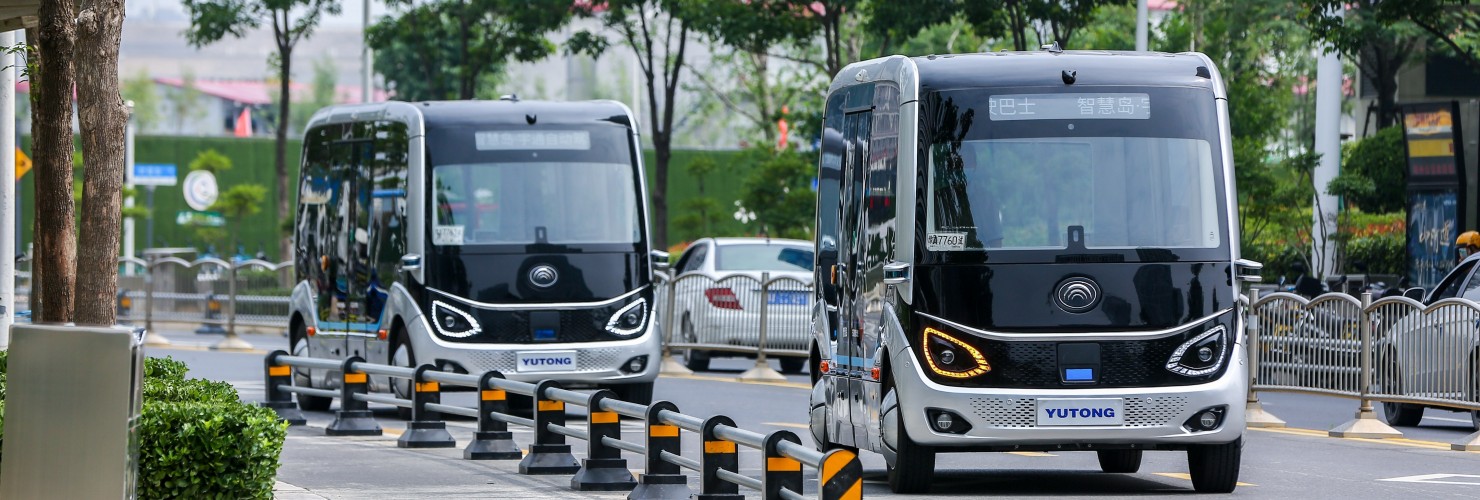

Cybersecurity regulations + Smart driving + Logistics
1. Companies face increased scrutiny under new cybersecurity regulations
At a glance: The regulations on Critical Information Infrastructure (CII) took effect on September 1. The State Council defines CII as important network infrastructure or IT systems that if breached or destroyed could cause harm to China’s national security, economy or public interests. The policy document lists eight specific sectors including telecommunications, energy and transportation in which CII is most likely to be found. Businesses that sell, purchase or use this infrastructure could then be considered CII operators (CIIOs), they must:
- Prioritize the purchase of secure and reliable network products and services
- Conduct an annual security review and risk assessment
- Report cybersecurity incidents and any changes to their CII to the relevant sectoral regulators and public security authorities
- Establish teams to constantly monitor cybersecurity
MERICS comment: Crucially, the policy does not specify which companies will be designated as CII providers or CIIOs and only states that regulators will make that decision. Network equipment and service providers, such as Nokia and Ericsson, as well as industrial software firms like ABB or SAP, will likely count as CII providers and rank among the most impacted foreign companies. Pressure to adopt “secure and reliable network products and services” will direct cautious firms to their Chinese competitors.
Companies that operate in the listed sectors, such as energy or transportation, risk being deemed CIIOs and may need to consider switching their suppliers of network equipment and services. In addition, according to Cybersecurity Law, such companies would be required to store personal and important data locally. This could create interoperability issues with business operations outside of China, or even destroy business models relying on cross-border data transfers. Given the broad definition of CII, companies outside of the selected industries could still benefit from tightening their data and cybersecurity. Having said that, it is unlikely that businesses dealing in consumer products will be impacted.
The regulations come at a time when Chinese decision makers regard cyberattacks as an immense threat to China’s national security and society. This is fueled by US-China tensions, the recent proliferation of cyberattacks globally and China’s relatively weak cybersecurity footing. The policy is part of a larger package of cybersecurity measures (e.g., the updated Multi-Level Protection System) that enforce the Cybersecurity Law. The cybersecurity review that followed Didi’s US IPO is an important warning sign for tech companies. To avoid being caught in the crosshairs of regulators, companies should make sure to be compliant.
Policy name: Regulations on the Security Protection of Critical Information Infrastructure (关键信息基础设施安全保护条例) (Link)
Issuing body: State Council
Date: August 17, 2021
2. MIIT steps up safety requirements for China’s smart driving sector
At a glance: The Ministry of Industry and Information Technology (MIIT) issued instructions to regulate the security of data generated and transmitted by smart connected vehicles and to strengthen passengers' safety. Following on from the recently released guidelines on cybersecurity standards for smart connected vehicles (see June issue), the policy document requires car makers to:
- Establish a data security management system, implement a data security risk assessment and data security incident reporting
- Localize data in China and only export data abroad after approval by relevant authorities
- Submit Over-The-Air (OTA, i.e., online-transmitted software upgrades) updates for in-car systems and autonomous driving features to MIIT for approval prior to installation
- Provide clear instructions and outline performance limitations to users for assisted and autonomous driving functions
MERICS comment: The opinions signal that China’s government is actively trying to keep up with the highly dynamic and innovative smart vehicle sector in China. Deadly accidents related to self-driving features, one of which involved China’s EV champion NIO, showcase the potential danger of an underregulated smart car sector. To reach the government’s targets to further commercialize smart cars (50 percent of new car sales by 2025), regulations like these are necessary to prevent further accidents and keep consumers confident in the new technology.
For foreign companies, regulation of the smart vehicle sector represents both an opportunity and a challenge. The government’s support for connected vehicles, 5G and digital infrastructure as well as regulatory guidance make China a pioneer in the sector and a top investment destination. New technology and business models involving data can be developed and tested there. Enhanced attention to the legislative framework surrounding driver security helps define the responsibilities of users and manufacturers.
Moreover, the difficulty and potential arbitrary nature surrounding data transfers abroad poses a potential roadblock for firms looking to use the tests and data generated in China for their global activities. In addition, the need to obtain MIIT approval for OTA updates of in-car systems and autonomous driving features is likely to increase costs for car manufacturers by delaying and complicating the rollout of upgrades, potentially hampering related business models.
Policy name: Opinions on Strengthening the Management of Connected Vehicles (Intelligent Networked Vehicles) Manufacturers and Product Access (工业和信息化部关于加强智能网联汽车生产企业及产品准入管理的意见) (Link)
Issuing body: MIIT
Date: August 12, 2021
3. MOFCOM issues action plan to optimize China’s logistics network
At a glance: Nine government agencies led by the Ministry of Commerce (MOFCOM) released a blueprint for modernizing China’s logistics system over the next five years. It seeks to decrease the cost and increase the efficiency of domestic business activities and international trade. Notable tasks outlined in the policy include:
- Integrate new technologies such as 5G, Big Data, the Internet of Things and AI into logistics networks
- Build a green logistics system by using reduced and recyclable packaging and equipment, transporting goods with clean NEVs, etc.
- Accelerate the development of cold chain logistics and extend the coverage of urban and rural cold chain facility networks
- Support enterprises to invest in international logistics infrastructure, such as overseas warehouses, and cultivate internationally competitive shipping companies which are “autonomous and controllable”
MERICS comment: Logistics is an integral part of Beijing’s ambitions to turn China into a manufacturing superpower. Upgrades to the logistics sector will increase the efficiency of production, improve access to Chinese consumers and enable local firms to capture more of the postproduction services.
The policy also bolsters one of the key pull factors for foreign companies operating in China: world class distribution networks. The combination of excellent infrastructure, complete industrial clusters, as well as the large and growing domestic market all contribute to China’s substantial appeal as a production base for foreign firms. As of February 2021, European companies registered their strongest commitment on record to remaining in or even expanding operations in China. Only nine percent indicated plans to shift some current or planned investments to other markets and only one percent planned to fully divest.
The Special Action Plan presents several specific benefits for foreign enterprises operating in China. Expanding the cold chain logistics networks will further increase the market for medical and food products. The move towards high tech logistic services, in the form of automatic guided vehicles and high-end warehouses, could create new opportunities for foreign firms to provide the software and equipment necessary for this transformation. They can also gain an advantage in promoting their green distribution and product disposal practices as officials strive to develop more environmentally friendly logistic networks.
Policy name: Special Action Plan for the High-quality Development of Trade Logistics (2021-2025) (商务部等9部门关于印发《商贸物流高质量发展专项行动计划(2021-2025年)》的通知) (Link)
Issuing bodies: MOFCOM, NDRC, MOF and others
Date: August 9, 2021
WORTH NOTING
Policy news
- August 2: The State Council issues guidelines on the evaluation of China's scientific and technology achievements, calling for increased participation from financial institutions and industry to improve the commercialization of scientific research (State Council notice (CN); State Council article (EN))
- August 2: Reuters reports that on May 14, 2021, the Ministry of Finance and MIIT issued guidelines for government procurement which sets local content requirements of 25 to 100 percent for 315 high tech items, many covering advanced medical equipment (Reuters article (EN))
- August 4: The National Development and Reform Commission (NDRC), MIIT and Ministry of Ecology and Environment issue a notice encouraging producers of home appliance (such as TVs, refrigerators, washing machines and air conditioners) to implement Extended Producer Responsibility systems and recycle waste products (NDRC notice (CN); Enviliance Asia article (EN))
- August 9: Guangdong province releases a 14th Five-Year Plan for the high quality development of the manufacturing industry, with a focus on building up the semiconductor industry supply chain in the region (Guangdong government notice (CN); Global Times article (EN))
- August 10: The NDRC and National Energy Administration publish a notice encouraging renewable power generators to add energy storage or peak-shaving facilities, which can address variations in energy demand and the ensure stable operation of the grid system (NDRC notice (CN); Reuters article (EN))
- August 13: The State Council publishes guidelines to reform the management of central budgetary research funding, including measures to simplify budget compilation and improve compensation for scientists (State Council notice (CN); State Council article (EN))
- August 16: The Beijing city government releases a Five-Year Plan for development of the local hydrogen energy industry, aiming for a network of 74 hydrogen refueling stations and introduce 10,000 hydrogen fuel cell vehicles by the end of 2025 (Beijing city government notice (CN); Xinhua article (EN))
- August 19: The Ministry of Science and Technology solicits public submissions regarding research directions in disruptive technologies to enhance efforts in achieving major scientific and technological innovations (MOST notice (CN); Global Times article (EN))
- August 20: The National People’s Congress passes the Personal Information Protection Law, effective November 1, which limits the legitimate scope for tech companies in handling personal data (see May issue) (National People’s Congress announcement (CN); Reuters article (EN))
- August 26: The Ministry of Transport issues guidelines on the role of S&T in China’s goal of becoming a transport superpower, calling for scientific breakthroughs in transport equipment and the development of disruptive technology in fields such as high speed heavy-haul freight trains (MOT notice (CN))
- August 27: The State Council releases a Five-Year Plan for employment, with a focus on promoting high-quality employment in the manufacturing sector and vocational skills training (State Council notice (CN); SCMP article (EN))
- August 27: The Cyberspace Administration of China (CAC) publishes draft rules restricting the use of recommendation algorithms by tech companies and proposing that users should be able to opt out of targeted content (CAC draft notice (CN); SCMP article (EN))
- August 27: MIIT and four other ministries issue regulations encouraging the reuse of NEV batteries, referred to as "cascade utilization," in areas such as base station backup, energy storage, charging, etc. and promoting cooperation between NEV producers, power battery manufacturers and cascade utilization companies (MIIT notice (CN))
Corporate news
- August 3: Chinese battery producer Envision AESC announces plans to build a 6GWh/year battery plant near Tokyo to supply Japanese carmaker Nissan; the investment is valued at USD 458 million (SPGlobal article (EN))
- August 5: Chinese Biotech firm BeiGene announces plans to build a new R&D and manufacturing base in New Jersey to accelerate its international expansion (Caixin article (EN))
- August 5: Huawei releases white paper on the expansion of 5G to 5G-Advanced (or 5.5G), drawing on input from industry partners such as China Mobile, Nokia, Ericsson, Samsung, SK Telecom and more (Huawei press release (CN); Huawei press release (EN))
- August 9: Geely Holding Group and Renault Group sign an agreement to jointly introduce Renault-branded hybrid vehicles in China and sell cars based on Geely’s Lynk & Co vehicle platforms in South Korea (Geely press release (CN); Bloomberg article (EN))
- August 13: CATL announces it is looking to raise CNY 58.2 billion (USD 9 billion) in a new share sale to more than double its production of electric car batteries (Sohu article (CN); Yicai article (EN))
- August 17: A former CAC official becomes new board director of ByteDance after a CAC-controlled investment fund buys a one percent stake of the company (Reuters article (EN))
- August 18: Baidu launches its second-generation AI chip, Kunlun 2, releases a prototype “robocar” and rebrands its robotaxi app as part of its strategy to expand its business in AI and related areas such as autonomous driving (Sina Finance article (CN); CNBC article (EN))
- August 20: Chinese steelmakers Ansteel Group and Ben Gang sign a deal to merge their operations; the restructuring will create the third largest producer of steel worldwide (People’s Daily article (CN); Xinhua article (EN))
- August 23: Volvo AB acquires JMC Heavy Duty Vehicle for USD 125 million; the acquisition follows China’s decision to get rid of the joint venture requirement in the commercial vehicle sector last year (Volvo press release (CN); Volvo press release (EN))
- August 25: Xiaomi announces that it will acquire Deepmotion, a startup that develops digital mapping technology for autonomous vehicles, as part of its expansion into the smart cars sector (Reuters article (CN); TechNode article (EN))
- August 27: China’s largest AI firm, SenseTime Group, files plans for an initial public offering on the Hong Kong Stock Exchange, reportedly seeking to raise USD 2 billion (Yicai article (CN); Reuters article (EN))
- August 30: Nikkei Asia reports that Envision Group, one of the largest wind turbine manufacturers in China, is developing a robot to offer mobile charging services for electric vehicles, meaning the robot can automatically seek out parked cars and charge their batteries (Nikkei Asia article (EN))

